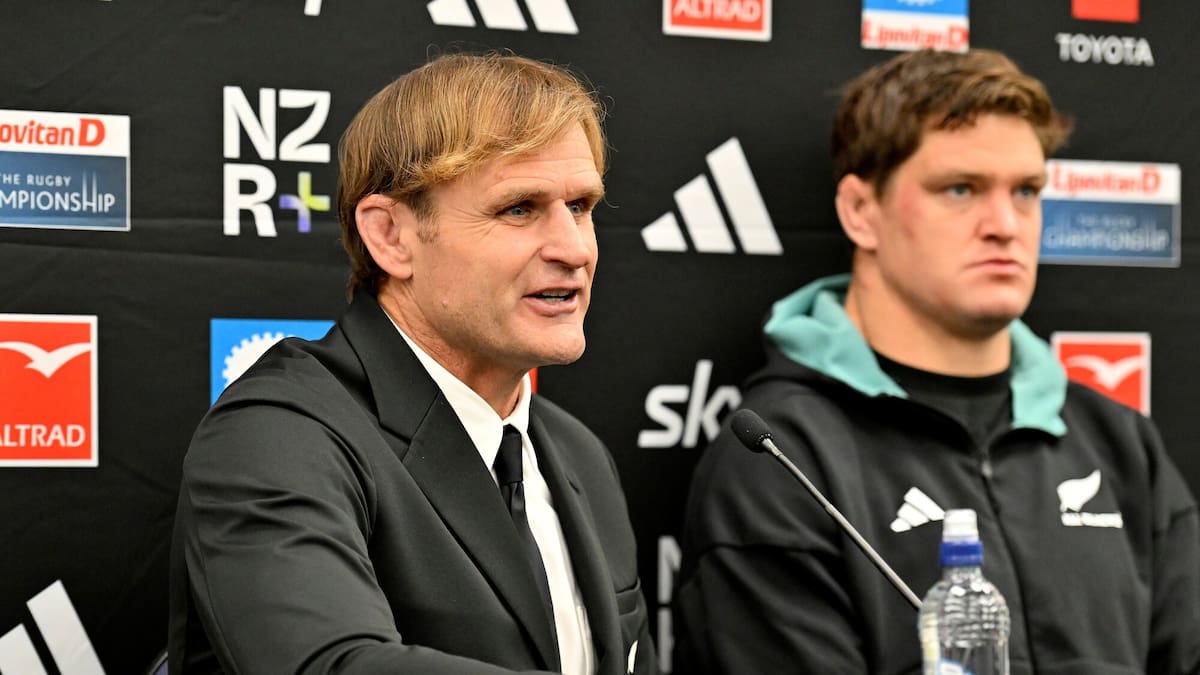As the team trotted back while Damian McKenzie slotted the touchline conversion, there was a palpable sense that the All Blacks had taken their first step on the road to somewhere special.
This was them finally going to breakthrough under head coach Scott Robertson, back-up their Eden Park win with another in Wellington that would be as innovative and as strategically savvy as the one in Auckland was gutsy and resilient.
For 18 months under Robertson, the All Blacks have been both tantalising and infuriating.
They have delivered in patches, and at times shown a stunning depth of resilience. But so too could they quickly melt down and lose games they had in the bag.
They had locked into a pattern where the nation wanted to believe in them but were never given the consistency of performances to quite get there, but nor were the All Blacks ever bad enough or so devoid of ability or structure as to make everyone give up on them.
So when Carter touched down after 18 minutes, the hope was valid. But 60 minutes later, that hope was destroyed because in conceding 36 unanswered points in the second half, the All Blacks confirmed they are indeed embarking on a journey, but the destination is not the promised land.
All Blacks captain Scott Barrett faces addresses the public after a record defeat to the Springboks in Wellington. Photo / Photosport
What’s become clear now is that the All Blacks have been up and down because this is who they are and what they have become.
This erratic version is their true selves, and a nation can hope differently, but it will be the hope that ends up killing them.
Rugby is just one more part of New Zealand in decline: one more thing eroding while everyone deludes themselves otherwise.
Delusions of grandeur are perhaps a geographic hazard of being a small, isolated island nation in the far reaches of the Pacific Ocean.
It’s easy to develop a superiority complex when there are so few external factors to regularly make comparisons against.
This is maybe why New Zealand can tell the world it is clean and green while it repopulates its urban car fleet with double-cab utes and plans to drill into the ocean floor, or indeed anywhere it suspects a fossil fuel may be buried.
This is why it can see hundreds of thousands of its best and brightest leave for Australia, but give visas to a few digital nomads and mad millionaires escaping what they think is an impending Armageddon and say New Zealand is the place the rest of the world wants to come to live.
And rugby is just an extension of this overconfident mindset that refuses to accept the contrary evidence that has built to say the All Blacks have been sucked back into the peloton and don’t necessarily have the innate qualities and preternatural instincts to find their way back out.
The hard facts that emerged from the weekend are that Argentina are the best attacking side in the Southern Hemisphere, closely followed by Australia and South Africa – with New Zealand a distant fourth.
Those three countries have shown they can generate flow and width from their structured attack, while New Zealand look laboured and confused in their strike plays – a problem made incongruous by the way the All Blacks continue to look like the masters at exploiting broken defences.
All Blacks loosie Ardie Savea shows his frustration after their humiliating 43-10 defeat to the Springboks in Wellington. Photo / Photosport
Three of the four Rugby Championship sides have developed effective kick strategies and defensive aerial responses, and one team haven’t.
Speaking immediately after the 43-10 loss Robertson said that despite facing criticism for it, South Africa have invested years in their kicking game and reaped the reward for that in Wellington.
But this concession merely invokes questions about why the All Blacks haven’t made a similar investment in skillset development.
Kick and catch are core elements of test rugby – skills that can be taught and improved.
To have fallen so far behind in the application of such a key facet can’t be blamed on the pass-and-run mentality of Super Rugby Pacific, where kicking duels are notorious by their absence, but acknowledged as a collective failing by the All Blacks to appropriately upskill an area of their game that routinely decides the outcome of tests.
The pattern of the last 18 months suggests the All Blacks will bounce back and win at Eden Park when they play the Wallabies in two weeks, but surely everyone knows that if they do, it won’t signal the dawn of a golden age.
And anyone who thinks otherwise should consider the words of former All Blacks captain Kieran Read, who told Sky Sport: “You have to look at that All Blacks side, okay, there’s something isn’t right there, there’s something within that group when you are able to just leak and leak, where’s that spine we want to see?.”
Gregor Paul is one of New Zealand’s most respected rugby writers and columnists. He has won multiple awards for journalism and written several books about sport.

